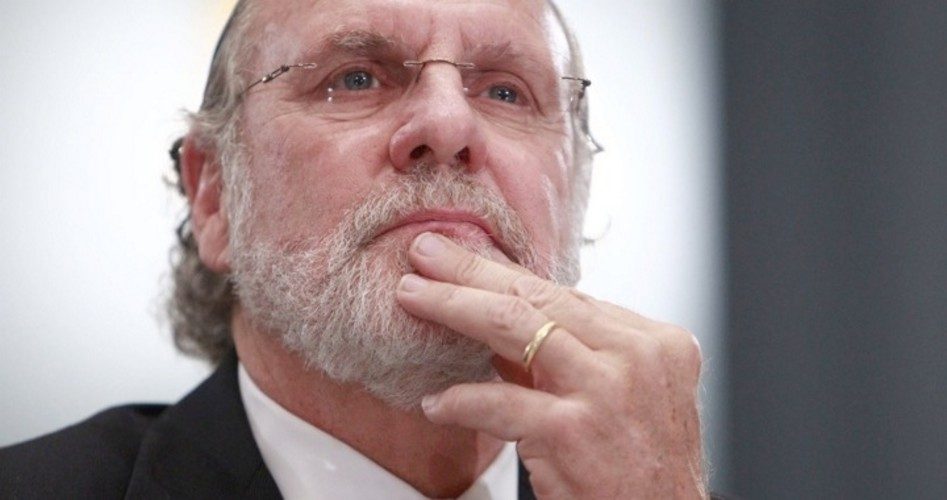
Ten months after stitching together the pieces of the MF Global collapse and bankruptcy in October 2011, the New York Times reported that criminal investigators aren’t likely to file criminal charges against the prime suspect: CEO Jon Corzine.
The unwinding and spectacular collapse of the derivatives trading firm began with a huge bet Corzine took with company money on risky European bonds, using leverage approaching 40:1. The initial bet was $1.5 billion but as he piled on, Corzine’s board of directors got nervous. He was able to placate — some say intimidate — them with his persona and a Powerpoint presentation and to let the trade ride.
Things began to unwind for Corzine as wind of the huge trade — which could wipe out MF Global’s capital five times over if it went bad — reached the ears of the Financial Industry Regulatory Authority (FINRA). When officials at FINRA demanded that MF Global increase its capital base to insure against the risk of the trade going south, Corzine balked and took his case directly to the SEC. Following his hasty visit to New York to visit with SEC officials, the SEC demanded that Corzine raise $200 million in new capital (instead of the $50 million Corzine offered) to offset the risks of the trade.
It didn’t take long for credit rating agencies to learn of this demand, and Standard & Poor’s dropped MF Global’s credit rating to junk status. From there it was just a matter of days.
Institutions such as JPMorgan demanded more collateral which was amplified by trading losses elsewhere in the company, forcing Corzine to move some $891 million from his customers’ accounts to its broker-dealer. As the Times noted, “MF Global dipped again and again into customer funds to meet the demands.”
All told, MF Global’s customers were out an estimated $1.6 billion.
Corzine adroitly sidestepped any responsibility in testimony he gave before congressional committees investigating the matter, and his assistant treasurer in Chicago, Edith O’Brien, took the Fifth. Corzine knew that any prosecution of his misbehavior would have to prove “intent” rather than incompetence or error, and so he was careful in his testimony before Congress:
I never intended anyone at MF Global to misuse customer funds and I don’t believe that anything that I said could reasonably have been interpreted as an instruction to misuse customer funds. [Emphases added.]
Journalist Matt Taibbi, who has not bought Corzine’s denials, wrote in Rolling Stone:
Nobody disputes the fact that MF Global officials dipped into customer accounts and took over $1.6 billion of customer money. We not only know that company officials reached into customer accounts, we know they brazenly lied to bondholders, ratings agencies and investors about the firm’s financial condition (“MF Global’s capital and liquidity has never been stronger,” wrote the CFO of MF Global’s holding company, on the same day Moody’s downgraded it to junk status)….
This is not complicated at all. This is just stealing. You owe money, you don’t have the cash to cover it, and so you take money belonging to someone else to cover your debts. There’s no room at all here for an argument that this money was just lost due to a bad investment, an erroneous calculation based on someone’s poor understanding of a complex transaction, etc. It’s straight-up embezzlement.
Taibbi also saw through the ruse that “chaos” reigned during the final days of MF Global’s collapse and that it, along with “porous risk controls,” were the real reason behind the collapse. Taibbi laughed this off:
I call this the “Wizard of Oz” defense: a Big Twister hit the firm’s customer accounts, chaos ensued, and when the dust settled, no one knew where the heck little Dorothy and her money had gone.
With the investigators passing on pressing for criminal charges to be filed against Corzine, there are several glaring ironies remaining. First, the huge bets that Corzine made with company money, and then with customers’ monies when the company’s funds were depleted, turned out to be profitable after all.
Second, investigators are currently negotiating with O’Brien, the assistant treasurer from Chicago, to waive her Fifth Amendment rights in exchange for immunity for her testimony about what actually happened in those last days.
Finally, rumors are surfacing that Corzine is about to start another investment company, this time a hedge fund where he will manage investors’ funds for them. There will be just one stipulation: they must have bad memories in order to play.
Photo of Jon Corzine: AP Images



